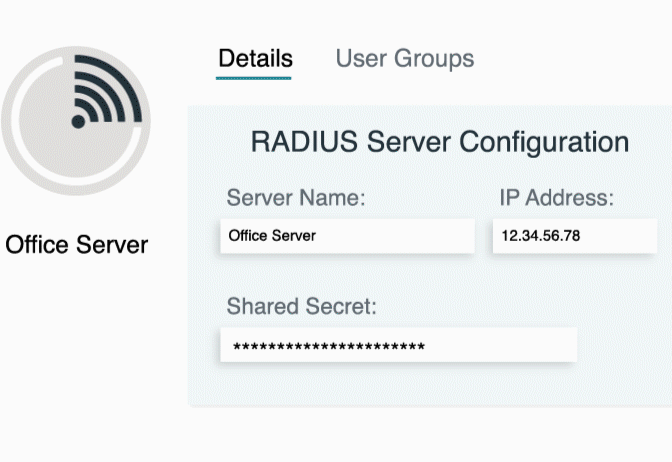RADIUS is one of the most widely used legacy protocols out there, and its purpose is to control access to and subsequently secure networks and network infrastructure.
This widespread popularity of the RADIUS protocol led to the emergence of FreeRADIUS as a cost-effective RADIUS solution.
The Emergence of FreeRADIUS
So, what is FreeRADIUS? FreeRADIUS is an open source installation of RADIUS that can be run on a local server. This makes FreeRADIUS a prime choice for many organizations that want to use RADIUS to secure their network access with little upfront cost.
FreeRADIUS (and RADIUS in general) can be used to require unique credentials for connections to Wi-Fi networks and virtual private networks (VPNs). With the sheer number of hybrid employees in the workforce, the use of RADIUS is essential in modern IT environments, to ensure that employees using VPNs to access your organization’s critical resources are doing so safely.
FreeRADIUS often shows up in the consideration sets of organizations looking to implement RADIUS, and like everything else in life, it comes with a handful of advantages and disadvantages.
Advantages of FreeRADIUS
You guessed it… the number one advantage of FreeRADIUS is that it’s free. But other than that, FreeRADIUS is scalable, it’s a security enhancement, and it’s modular.
Scalable
FreeRADIUS is highly scalable — it can go from handling a couple of requests to hundreds or thousands when configured properly. FreeRADIUS offers performance advantages for organizations with no need to buy more product licenses.
Secure
As mentioned earlier, the whole point of implementing RADIUS is to improve security, and FreeRADIUS does this beautifully. FreeRADIUS allows users to sign into networks with their own unique credentials, thus eliminating the use of the SSID and shared passphrase to access a network. IT admins can also move users into separate VLANs with ease, thus improving security considerably.
Modular
FreeRADIUS has a modular design, which makes it easy to tailor to your specific needs. Easily add or remove modules based on your goals, without affecting security or performance. This capability makes FreeRADIUS a great option for large enterprises and small businesses alike.
Disadvantages of FreeRADIUS
A disclaimer here is that these disadvantages are specific to FreeRADIUS used on its own, but all of these can be avoided by implementing a hosted RADIUS solution, which we’ll explain after this section.
FreeRADIUS, when used on its own, can be complicated to implement, integrate, and manage without the right people, knowledge, and tools. It can also become more costly than you expect, which is important to keep in mind.
Complicated Setup and Implementation
The setup and configuration involved with FreeRADIUS implementation has proven difficult, and many IT admins don’t want to deal with the hassle. People often complain about the complexity, even for getting the bare minimum capabilities set up, as well as issues with adding or removing modules without getting an experienced IT professional involved. FreeRADIUS is quite cumbersome and difficult to manage without IT employees that have the adequate skills to do so as well as experience implementing open source software.
Unexpected Costs
Although the initial download and setup of FreeRADIUS is free, organizations still need to pay for server hardware to run RADIUS, including building RADIUS failover and redundancy. These costs can be unexpected and frustrating.
Wi-Fi and Identity Provider Integration Issues
FreeRADIUS has also proven to be difficult to integrate with Wi-Fi access points, as well as with identity providers — both of which are very important parts of the RADIUS implementation process.
Device Integration Issues
What’s more, FreeRADIUS is also known to be difficult to integrate with the devices in an organization. This is because the devices used to authenticate users via RADIUS need to have the correct RADIUS protocols and setup in order to be usable. However, if this configuration goes wrong, there is an added risk of failure and potential downtime.
Third-Party Tool Integration Issues
And the final disadvantage of FreeRADIUS that we want to touch on is another integration issue, this time with third-party tools. This is a big deal because all IT environments consist of a plethora of different tools for productivity, security, and more. These tools all need to integrate well to keep your org secure and productive.
However, FreeRADIUS is known to be difficult to integrate with those tools, including single sign-on (SSO) tools and productivity suites such as Google Workspace and Microsoft 365 — which are staples in many IT environments.
Mitigating FreeRADIUS Challenges With Hosted RADIUS
Now that you recognize the advantages and disadvantages of FreeRADIUS, you’ll understand why many organizations want the capabilities of FreeRADIUS without the associated headache, and thus feel like they’re in a bind.
To achieve this kind of setup and reduce or even eliminate the hassle of RADIUS setup and management, many orgs choose to employ a hosted RADIUS implementation through a directory service.
JumpCloud Hosted Cloud RADIUS
A great example of this is JumpCloud’s open directory platform with native RADIUS capabilities. When your organization signs up for JumpCloud, you get to enjoy hosted RADIUS, where JumpCloud has done the setup for you, and none of the traditional hardware is needed. JumpCloud leverages preconfigured FreeRADIUS servers to provide network security to any organization, regardless of your environment or location.
Simply use the JumpCloud Console to create individual users and groups of users, and then connect them to the proper networks via built-in RADIUS. JumpCloud’s Cloud RADIUS functionality even includes the ability to dynamically assign VLANs based on groups. The same rings true for VPN connections, to which admins can apply multi-factor authentication (MFA) for even tighter security.



